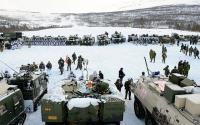Recent News

The author argues against U.S. ratification of UNCLOS, writing that the treaty’s most dangerous aspect is "creating a 'dynamic and evolving body of law.' America already is paying the price for far too much and too expansive litigation domestically. The U.S. Senate should say no to LOST."
[ More ]
Last week, the EU, US and Japan formally asked the World Trade Organisation (WTO) to look at China’s export restriction on rare earth metals. Lawyers believe the case will run and run.
[ More ]
A new study indicates that the Arctic Ocean is also becoming more acidic, another consequence caused by greenhouse gases in the atmosphere. It’s a process that occurs when carbon dioxide dissolves out of the air and into the sea, lowering the water’s pH in the process.
[ More ]
The authors, senior researchers at the American Enterprise Institute, argue that China's aggressive behavior in the South China Seas will not be resolved by U.S. ratification of UNCLOS, but will only lead to "endless legal and diplomatic wrangling."
[ More ]
John Nissen, a former software engineer who has become alarmed at the possibility of reaching a climate "tipping point" argued for Arctic geoengineering as soon as possible in a poster presentation at the American Geophysical Union meeting in San Francisco last week.
[ More ]
The editors argue that contrary to any percieved risk to U.S. sovereignty from ratifying UNCLOS, the greater threat "to the U.S. lies in its continued failure to ensure it will have a central role on this new [Arctic] frontier."
[ More ]
"The Law of the Sea Treaty (LOST)—signed by the U.S. in 1994 but never ratified by the Senate—is showing some signs of life on Capitol Hill, even as new circumstances make it less attractive than ever. With China emerging as a major power, ratifying the treaty now would encourage Sino-American strife, constrain U.S. naval activities, and do nothing to resolve China's expansive maritime territorial claims."
[ More ]
The author argues that "[i]t’s time to pay attention to security for undersea cables—crucial to global communications and commerce, and vital to our national interests."
[ More ]
For the past decade, while the West has been consumed battling Islamic extremists in the Middle East and Central Asia, China has been engaged in a rapid and impressive effort to establish itself as the supreme maritime power in the Eastern Pacific and Indian Oceans.
[ More ]
The author challenges the recent discovery of Rare Earth Elements in the seabed by noting that there are still a number of technical, financial, and political challenges that have to be overcome before mining these deposits are economically viable.
[ More ]